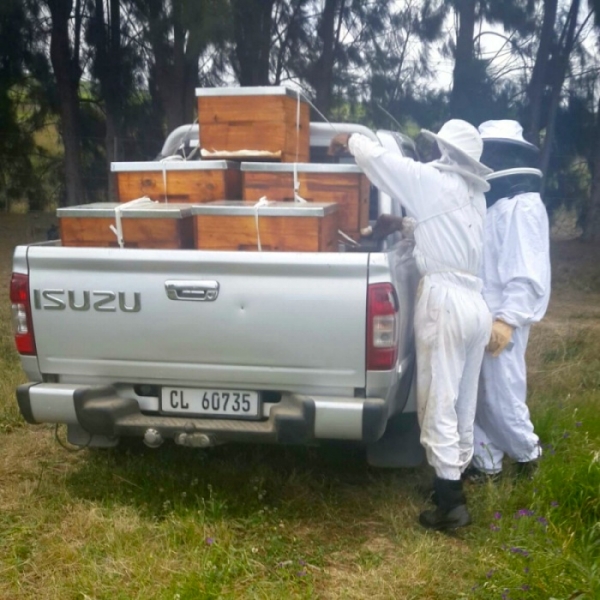Sweet deal for Kayamandi beekeeper

Six years ago, Loyiso Mbete from Kayamandi in Stellenbosch saw a gap and struck a deal to buy 80 beehives from a local farm. Now the 35-year-old part-time construction contractor runs a thriving beekeeping business with more than 320 hives on several farms across the winelands in the Western Cape.
After purchasing the 80 hives from Timberlea Farm in 2009, Mbete approached the Department of Agriculture for assistance. With help from the Department, he attended a beekeeping course and graduated with a Diploma in Management from the Cape Peninsula University of Technology in 2013. He then received about R680,000 from the Department to grow his business.
“While attending the beekeeping course I realised what a huge gap in the market there was and saw an opportunity to make what I had bigger. At first I didn’t know what to do. I really learnt from doing my own research and visiting different beekeepers to learn from them,” he says.
Mbete currently lives on Timberlea Farm in Stellenbosch with his wife, Zinzi, and their three-year-old daughter. The rows of hives are hidden in the vineyards. At this time of year - winter - the bees are asleep.
Mbete says he visits all his hives at least once a week. He has employed three men from Kayamandi who help with the maintenance of the hives and harvesting the honey.
“Bees are not like cattle that need to be monitored regularly. The only thing we really look out for is theft, fires, vandalism and diseases.
“I don’t feed my bees, I let them eat from nature so they can produce organic honey.
“We harvest the hives before winter kicks in. August is the main pollination season and we usually move the bees closer to Worcester and Bredasdorp around September where there will be more canola,” he said.
Once the honey has been harvested, Mbete says, it is bottled and packed in Paarden Island. His variations of organic honey including Fynbos and Canola are currently sold at the Timberlea Farm stores and his honey has just been added to the Wellness Warehouse’s list of health food products.
In a speech earlier this month, Stellenbosch mayor Conrad Sidego he was “extremely proud of this project and the willingness shown by Loyiso.”
According to recent research done by the Cape Agency for Sustainable Integrated Development in Rural Areas, demand for honey far exceeds supply and there is a shortage of honey in South Africa. The research found that the shortfall was being made up with imports of Chinese honey, which is banned in Europe because of quality concerns.
Mbete says he plans to expand his business to benefit women in the community.
“Eventually we will use the wax to make other products. What I like about beekeeping is that there’s no waste because everything is useful. My goal is to get to 1,200 beehives by the end of the year. The next stage of my project is to develop other black beekeepers in the community. I want to take a group of women and give each about 100 hives to maintain. I will buy the honey from them, bottle it and sell it. That way, they make a living and my business can expand, possibly into the export industry. I will hopefully have it going by next year,” he says.
He says there is a need to educate people in the community about the importance of bees and about honey production.
“In Stellenbosch particularly, bees play a significant role in pollination. I grew up in Transkei, seeing bees in the field. We would try and provoke them and they would sting us. We really had no idea how much harm we were actually doing.”
“It’s important that when people take honey they leave some for the bees.”
Next: Sick miners: time for the mines to share the burden
Previous: Commuters angry at Metrorail increases

This article is licensed under a Creative Commons Attribution-NoDerivatives 4.0 International License.


